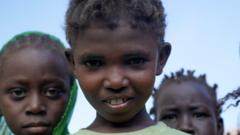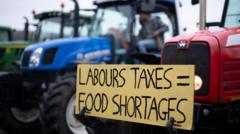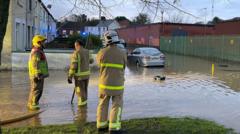Sudan is experiencing the world’s worst humanitarian crisis, with nearly five million children displaced and facing extreme hardship. The ongoing conflict between the Sudanese army and the Rapid Support Forces (RSF) has created a devastating situation where 25 million people, more than half the country’s population, urgently need assistance.
UN humanitarian chief Tom Fletcher recently visited Sudan to highlight the severity of the crisis. During his trip, he encountered heart-wrenching stories of displacement and survival, such as that of Mahmoud, a 13-year-old orphan who has been displaced twice. Despite losing his front teeth and his home, Mahmoud remains hopeful, expressing a wish to become a state governor and rebuild destroyed homes.
The conflict, which erupted in April 2023, has forced 11 million Sudanese to flee their homes, creating unprecedented challenges for humanitarian aid. The war has been characterized by horrific violence, systematic looting, and shocking abuse. Famine has already been declared in some areas, with many more people on the brink of starvation.
The UN and aid agencies are struggling to deliver assistance due to complex political and logistical challenges. Recently, army chief Gen Abdel Fattah al-Burhan granted the UN permission to establish more supply hubs and use additional regional airports for aid delivery. The World Food Programme (WFP) has also secured access to critically affected areas, including the Zamzam camp in Darfur, which houses about half a million people.
The crisis extends beyond food insecurity. The UN describes sexual violence as “an epidemic” in Sudan, with all warring parties accused of using starvation and sexual violence as weapons of war. During the “16 days of activism” campaign against gender-based violence, Fletcher emphasized the urgent need to do better in protecting vulnerable populations.
Local aid workers and survivors, like Romissa and Mama Nour, highlight the resilience of the Sudanese people. Mama Nour, who runs a safe house called Shamaa for abused women and orphaned children, exemplifies the community’s efforts to support those most affected by the conflict.
Despite these challenges, there are glimmers of hope. Local organizations are working tirelessly to provide support, and international agencies are increasingly focused on addressing the crisis. However, the situation remains dire, with aid workers describing it as the most difficult and dangerous environment they have encountered.
The UN and humanitarian organizations continue to call for increased attention and support for Sudan. As Fletcher stated, he is willing to “go anywhere, talk to anyone” to get aid through and save lives. The Sudanese people themselves are calling for unity and international solidarity in their time of greatest need.




